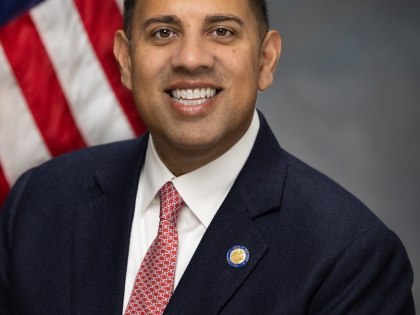
The Child Maltreatment Epidemic in Monroe County and New York State
April 28, 2025

Amid a flurry of recent attempts by the federal government to cut critical funding, one proposed cut has the potential to directly impact critical services being offered here in Monroe County. A recent report indicated that the Trump Administration is considering a 30% cut to the Department of Health and Human Services, a decision that would ripple through agencies like the National Institutes of Health (NIH). As one of only three NIH-funded child abuse prevention centers in the country, University of Rochester’s Mt. Hope Family Center relies on this funding to keep our children safe.
Child maltreatment, including physical abuse, sexual abuse, and child neglect, is a pervasive public health problem, with estimates indicating that over 12% of children in the United States will experience maltreatment by age 18. Child abuse and neglect increase risk for negative outcomes throughout the child’s lifetime, including mental health challenges, difficulties in relationships, physical health consequences, accelerated aging, and even premature death. Child abuse is also very costly, with an annual incident economic burden of $428 billion. And child-abuse related fatalities are all too common, with nearly 2,000 children dying from abuse and neglect in the U.S. each year—more deaths than from all forms of pediatric cancers combined.
New York State currently faces a child maltreatment-related fatality crisis, with over 300 children dying of maltreatment-related causes every year, accounting for over 12% of nationwide child maltreatment-related fatalities. Monroe County has faced particularly jarring rates of child fatalities where, averaged over 12 years from 2010-2022, children die of maltreatment-related causes at 4.1 times the national per capita rate and twice the New York State per capita rate (see Figure 1). This amounts to roughly two children per month with over 60% of these cases involving children under the age of one.
A review of fatality case reports published by the Monroe County Child Fatality Review Team shows that the majority (52%) of child fatalities are attributable to child neglect including severe physical neglect, medical neglect, or lack of proper supervision with another 5% due to the intentional harm of child abuse. These fatalities are preventable.
Preventing child abuse and neglect-related child fatalities will include working closely with families and new parents to offer guidance and support. Home visiting programs, for example, involve trained professionals providing individually tailored, in-home support that have been shown to reduce harsh physical punishment, parenting stress, and parental mental health and substance use problems, which in turn, reduce risk for child fatalities. Home Visiting has also been shown to be effective for families at the highest risk for fatalities, particularly those who are already engaged in the protective service system.
And that’s where Mt. Hope Family Center and their lifesaving work comes in. As a nationally recognized Center of Excellence in the prevention and treatment of child abuse and neglect, and the only such center in New York State, the team at Mt. Hope understands the challenges our families face, and recognizes the work ahead to slow the rise of child maltreatment-related fatalities in Monroe County.
One such program offered in Monroe County is Building Healthy Children (BHC). BHC was co-created through a partnership between the Mt. Hope Family Center, the United Way, and the Monroe County Department of Human Services to meet the unique needs of families within Greater Rochester. BHC is backed by rigorous research as a home-based visitation program that offers support and information to expectant parents throughout pregnancy and during the first three years of their child's life. BHC brings together behavioral health therapists and community health social workers to team up with families to address concrete goals such as food scarcity, housing needs, and transportation. The team assists in well-baby and medical visits and addresses parenting skills, including safe sleep, and how to deal with the stressors associated with parenting.
BHC also connects families with essential public services that promote self-sufficiency, including guiding parents in meeting their employment and educational goals. BHC therapists are crossed trained in several evidenced based interventions to support families around parenting, child development, parent-child relationships, and parental mental health including depression, anxiety, and, for many parents, recovering from the trauma of their own childhood experiences thus interrupting an all-too-common intergenerational cycle.
Monroe County has been a leader in this space and has made strides to protect our children, but we know there is always more than can be done. While showing promising outcomes for Rochester’s families, home visiting programs such as BHC are scarce, under-funded, and have long waitlists of families who are in need. That’s why now more than ever we have to support programs like these at the state level, and push back against proposed funding cuts that could put these critical initiatives at risk. We should not be making cuts, but increasing investments into innovative preventive services offered through community organizations such as the Mt. Hope Family Center.
As April is child abuse prevention awareness month, we are acutely aware that more resources are needed in the Greater Rochester area to combat this resurgence of child abuse and neglect, and it’s our responsibility to continue to push for these resources for the wellbeing of our children.
Jeremy Cooney represents the 56th District in the New York State Senate. Dr. Jennie Noll is the Executive Director of the University of Rochester’s Mt. Hope Family Center.
Share this Article or Press Release
Newsroom
Go to NewsroomSenator Cooney Reacts to City Council Vote on Census Office in NYC
December 5, 2025

Senator Cooney Hosts Annual Year End Community Award Ceremony
December 3, 2025


